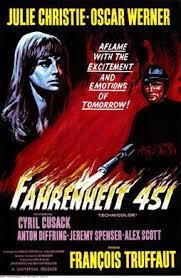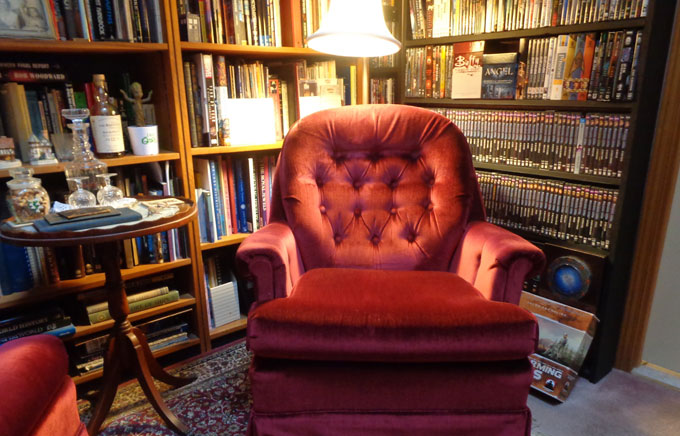
In the future, a totalitarian government uses firemen to destroy books. They are allowed to search anyone, anywhere, anytime to burn books. One of them, Guy Montage (Oskar Werner), meets Clarisse (Julie Christie), a young schoolteacher in trouble because she loves books. She asks him if he ever reads the books before he burns them, and he decides to read David Copperfield. He is hooked in short order. He gets in trouble with his wife, who worries about her reputation because she wants to join an interactive TV show called The Family.
In the house of an illegal book collector, Fire Captain Beatty (Cyril Cusack) discusses how books make people unhappy and think they are better than others, making them antisocial. The old woman collector (Bee Duffell) dies in the fire rather than live without her books. At home, Montag tries to tell his wife and her friends about it. He calls them zombies and tells them they are missing out on life. He reads a particularly emotional passage, and one woman breaks down in tears. The others leave in disgust, saying he is sick. That night, he dreams of Clarisse as the dying book collector. Clarisse’s house is raided, but she escapes. Montag breaks into Beatty’s office, looking for information on her.
He finds Clarisse and helps her break into the house and destroy lists of other collectors. She tells him of a sect called book people, who memorize books to keep them alive. The last raid for Montag turns out to be his own house. Linda leaves him, he destroys the bedroom and the TV before being forced to set fire to the books. Beatty pulls a book out of Montag’s coat and Montag kills him with the flamethrower. The authorities announce that Montag is dead rather than admit he escaped. He becomes one of the book people, beginning with Edgar Allan Poe’s Tales of Mystery and Imagination.
The film was based on Ray Bradbury’s 1966 novel. Some things were changed, among them the added romance between Montag and Clarisse. It was directed by Francois Truffaut, his first in color and his only English film. It was nominated for a Golden Lion at the 1966 Venice Film Festival. Truffaut’s diary of the production was published in English and French. The movie received mixed reviews, but it has since become a classic. Ray Bradbury was particularly pleased with the lyrical climax behind Bernard Herrmann’s score. It happened to snow when it was filmed and that added to its beauty and poignancy.
Unable to get Jean Seberg or Jane Fonda for Clarisse, Truffaut decided to use Julie Christie for both Montag’s girlfriend and wife, which is interesting, but Julie Christie was simply not a good enough an actress to bring it off. Also, she was Terence Stamp’s old flame and he thought she would overshadow him, so he declined to play Montag. Oskar Werner was hired and was not up to snuff as far as Truffaut was concerned. They ended up hating each other and would not speak for weeks. Werner cut his hair, purposely to create a continuity error in his final scene. Charles Aznavour and Jean-Paul Belmondo were considered for Montag, but it was thought they were not well enough known to English audiences. Paul Newman, Peter O’Toole, Montgomery Clift and Terence Stamp were considered as well.
The film’s opening credits are spoken and not printed, as a reference to illiteracy. Afraid of lawsuits, the studio asked that no books by living authors be burned, but Truffaut said they would think it an honor. Ray Bradbury asked a fire chief at what temperature books burned and he said 451 F. Ironically, he found out by burning a book. Among the books burned are Cahier du Cinema, for which Truffaut wrote, and both The Martian Chronicles and Fahrenheit 451 by Ray Bradbury. On the long list of books shown or mentioned are some of the most important books in history. Including, ironically, Mein Kampf. The TV sets in the movie are all flat-screen, thirty years before they were invented.
